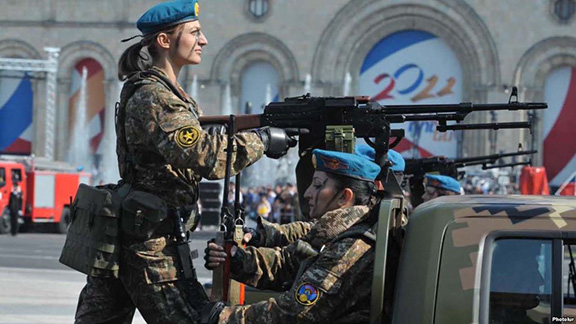Armenian Ministry of Defense Encourages Women’s Service in Army
YEREVAN (ARMENPRESS)—Minister of Defense of the Republic of Armenia, Seyran Ohanyan, encouraged the participation of women in the military during a meeting with youth in Tsaghkadzor on August 21, saying that the army needs the presence of women and their “intellectual abilities.”
“Many girls serve in the Armed Forces of the Republic of Armenia. The latter are included in different types of service of the field. There are girls in the special forces unit, there are girl snipers. Year by year the number of girl cadets in military institutions of the Ministry of Defense of the Republic of Armenia increases,” Ohanyan said at the Baze 2015 Pan-Armenian Youth Gathering.
“Armenian men view the matter from another viewpoint. The majority of them prefer women to stay at home, start families, be the foundation and preserver of the family, have many children, which will solve many demographical problems,” Ohanyan said, adding that Armenian women must have as many children as they can to help the army.
The gender of a child, according to Ohanyan, is not important; if a son is born, he is the soldier of his nation, and if a daughter is born, she is the future mother of the soldiers, Ohanyan said.
Ohanyan said that it is too early to talk about the compulsory induction of women into the army.
Responding to a question of an Armenian student on whether the OSCE Minsk Group contributed to peace in Nagorno-Karabakh, Ohanyan said, “I’m positive about the activity of the OSCE Minsk Group, realizing that the settlement of the Karabakh conflict cannot happen in short period of time.”
The OSCE Minsk Group activity, according to Ohanyan, contributed to an establishment of a relative peace between the parties to the conflict. “We don’t think there must be changes in the number of the OSCE Minsk Group Co-Chair countries. Of course, currently a certain decrease in the OSCE Minsk Group’s political potential is observed. I mean the controversies of Russia with the US and European countries, but this doesn’t interfere with their effective work in their role as mediators,” Ohanyan said.

